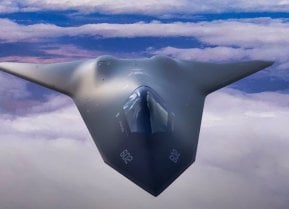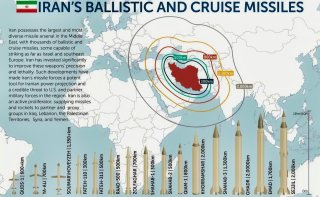Appeasement of Iran: The Path to More Conflict in the Middle East
When they look across the Middle East and beyond, Iran and its terrorist minions in the “axis of resistance” must be happy with what they see – a global community that not only refuses to confront their aggression but actually rewards it, laying the groundwork for more war down the road.
When they look across the Middle East and beyond, Iran and its terrorist minions in the “axis of resistance” must be happy with what they see – a global community that not only refuses to confront their aggression but actually rewards it, laying the groundwork for more war down the road.
For starters, the United States, NATO, and senior European Union officials all expressed their condolences on the recent deaths in a helicopter crash of President Ebrahim Raisi and other top Iranian officials.
Such diplomatic niceties are appropriate at times, but Raisi was a close ally of the virulently anti-Western Supreme Leader Ali Khamenei; he was known as the “Butcher of Tehran” for his “role” in the deaths of thousands of political prisoners in 1988; and he directed the brutal crackdowns of public protests in recent years in which hundreds were killed and more than 20,000 were detained.
While the condolences must have delighted the mullahs in Tehran, they outraged human rights activists within Iran who oppose the authoritarian regime and have been the targets of its ire.
Meanwhile, the International Atomic Energy Agency reported last week that Tehran is enriching more uranium to near weapons-grade purity – enabling it to make enough weapons-grade uranium for almost eight nuclear weapons in a month – and that Tehran continues to thwart the IAEA’s efforts to monitor all its nuclear activities.
Nevertheless, Washington reportedly is pressing its European allies not to censure Tehran at the IAEA’s next board meeting in early June, out of fears that a censure could further raise Western tensions with the Islamic Republic and give Tehran a “pretext” to further expand its nuclear activities.
The world also is rewarding the terrorists Tehran sponsors, funds, and equips for their aggression of late.
Spain, Norway, and Ireland in recent days “formally recognized” a new Palestinian state that would include the West Bank, Gaza, and East Jerusalem in hopes of bringing peace to, or imposing it on, Israel and the Palestinians. In addition, Algeria proposed a draft UN Security Council resolution to demand, among other things, that Israel “immediately halt its military offensive” in Rafah.
Such moves can only encourage Hamas, which slaughtered 1,200 Israelis in barbaric fashion on October 7, to continue its efforts, as outlined in its charter and reiterated in the public comments of its leaders, to destroy Israel and create a Palestine “from the [Jordan] river to the [Mediterranean] sea.”
While Hamas has resumed its rocket attacks from Gaza in recent days, Hezbollah continues the rocket barrage from southern Lebanon that it began on October 8 in solidarity with its “axis of resistance” partner.
Lest he needed further encouragement, Hezbollah Secretary-General Hassan Nasrallah boasted that the International Criminal Court’s decision to seek arrest warrants for Israeli Prime Minister Benjamin Netanyahu and Defense Minister Yoav Gallant was the outgrowth of all different kinds of global pressure on Israel.
None of this bodes well for a peaceful future for the region, no matter how long Israel’s war with Hamas continues.
Buoyed by Western divisions over Tehran and global condemnations of Israel, Iranian officials are mapping out plans to escalate short-term attacks on the Jewish state while developing a strategy to destroy it over the long term.
For the short term, Iranian officials met in Tehran with members of its “axis of resistance” and directed that Hamas harden its stance in negotiations with Israel over the hostages and a ceasefire, ambush Israel’s forces and abduct its soldiers, and conduct military operations throughout Gaza.
It also directed Hezbollah to use long-range precision missiles and Russian-made anti-aircraft missiles to bring down Israeli planes. Hezbollah would be using such missiles for the first time in its battles with Israel, and it hopes to “stun” Jerusalem and the world with its ability to down Israeli aircraft.
For the long term, Iranian officials are “drawing lessons” from the current war, which they believe has revealed “Israeli vulnerabilities,” to develop a strategy to destroy its arch enemy once and for all.
Convinced that they and their proxies are winning the current war, Iran’s leaders are “examining ways to use proxy forces and terror to destabilize the Israeli state and Israeli society” – that is, to destroy Israel without having to defeat the Israeli Defense Forces and without triggering a war that could “draw in the United States.”
Those in Washington, in Europe, at the United Nations, and elsewhere who are appeasing Tehran, pressuring Jerusalem, and recognizing a Palestinian state may believe that’s the path to more peace and stability. But, in fact, they’re encouraging Tehran’s nuclear and hegemonic ambitions, as well as genocidal intentions against the Jewish state, which it shares with its terrorist proxies.
Only a serious U.S., Western, and global change in direction will ease the momentum for greater conflict in the coming months.
About the Author
Lawrence J. Haas is a senior fellow at the American Foreign Policy Council and the author of, most recently, The Kennedys in the World: How Jack, Bobby, and Ted Remade America’s Empire (Potomac Books).
Image Credit: CSIS/Creative Commons.


